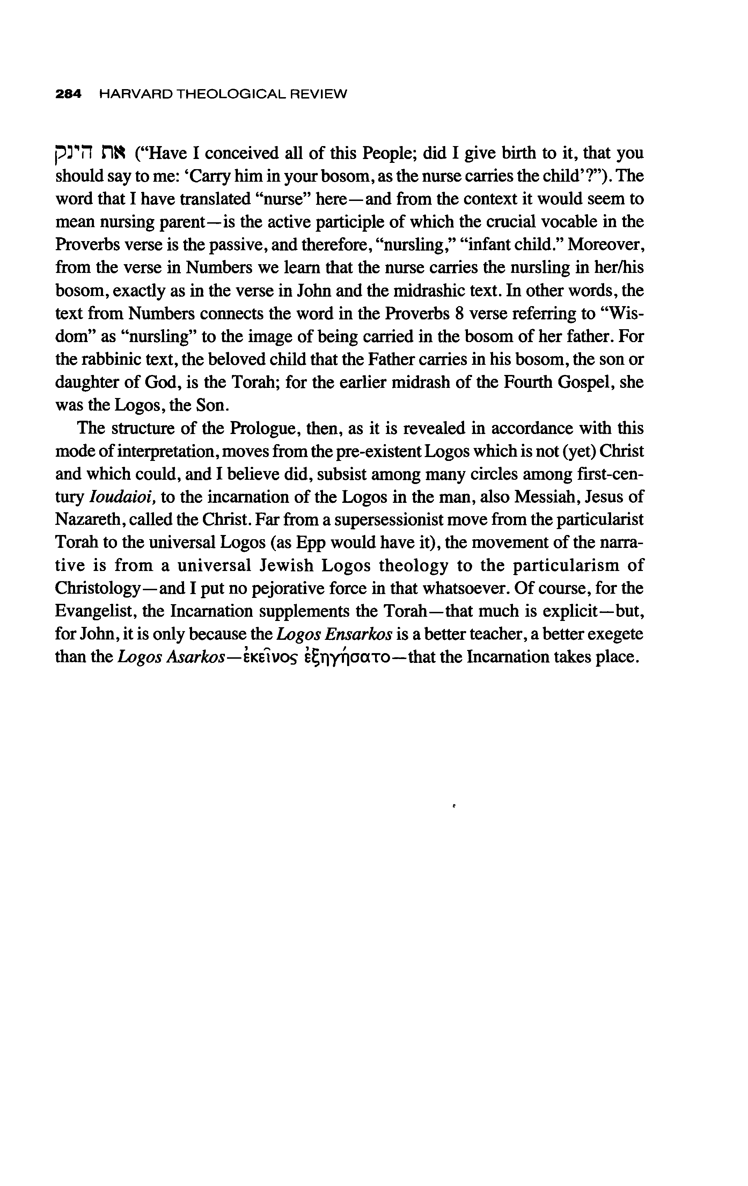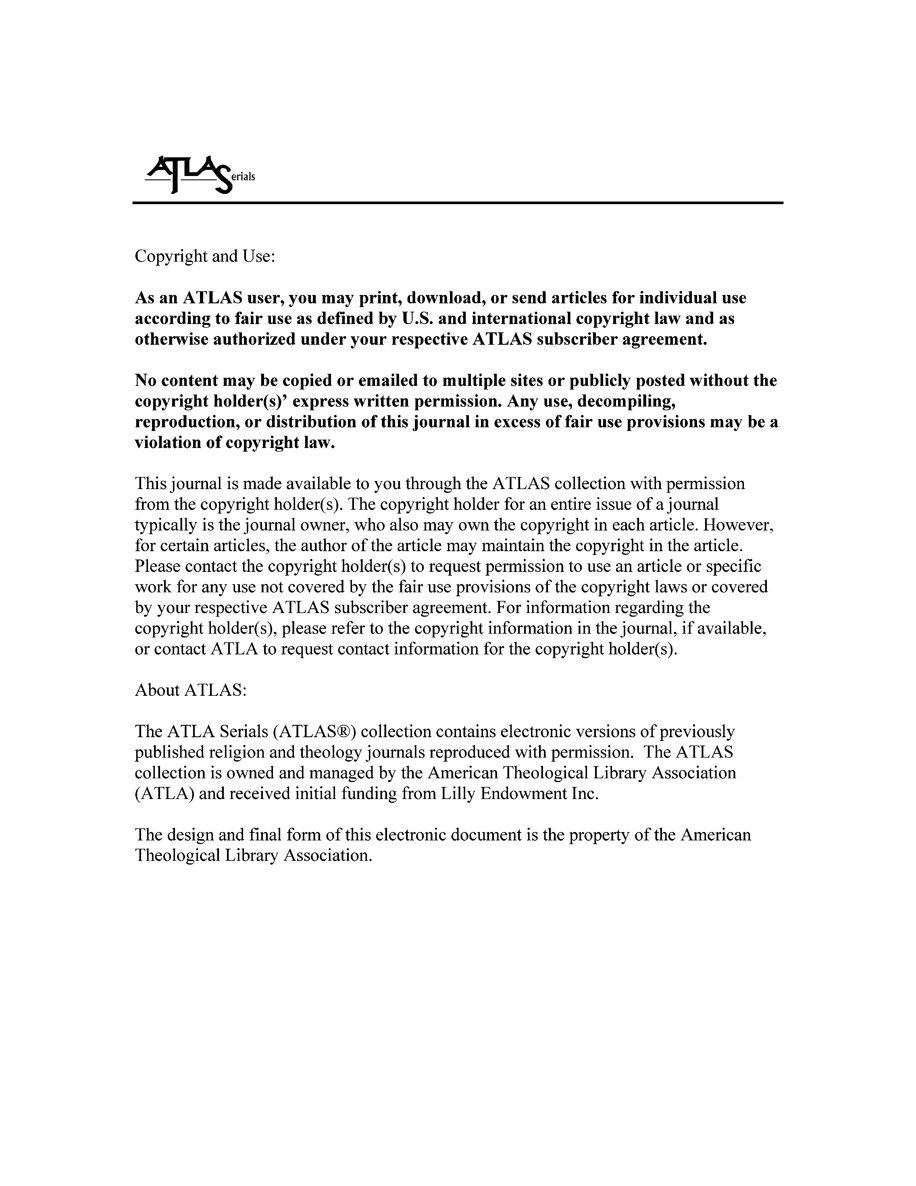rabbinism has parted.
As an emblem of this exchange, I would conclude with the following astonish-
ing juxtaposition: θεον OXSSBIS έώρακεν πώττοτε* μονογενή 0sbs ο ών e'is τον κόλπον
του ffaxpbs èmvos έξηγησατο ("No one has ever seen God; the only Son, who is
in the bosom of the Father, he has made him known," John 1:18) and ΊΐΙΓ^Κ Ό Ί
*mm DTip ΓΙΤΎΠ ΠΙΠΊΚΙ D-raizn mao a m "IQIK ^byn -or -m bv i n
OK^O ην π τ ϋ m o w ττηρπ bv Ί|ΤΓΠ nroioi rmro m m nrrn nbwn
visb npnüD or or D-mrare? ΓΤ-ΠΑΙ ]IDÄ I ^ K rrnm ΊΏΚΜ men ("Rabbi
Elicezer the son of Rabbi Yose the Galilean says: Nine hundred and seventy four
generations before the world was created, the Torah was written and lying in the
bosom of the Holy Blessed One and singing song with the serving angels, as it
says: Ί was his nursling/, or, and I was his little child/, or, I was his betrothed,159
and I was daily his delight, playing before him at all times,' " Prov. 8:30).160 It
seems almost certain to me that the verse of the Gospel is based on an ancient
midrash similar to the one found in the late rabbinic text, where the subject has
been transferred from Wisdom (the Logos) to Torah.1611 believe that the key to
explaining this midrash (both the Gospel and the late rabbinic version) is, in fact,
the common midrashic practice I have remarked on above—of building on a verse
that is not cited in the text at all. In Num 11:12, we read: bu ΠΚ ΤΙΉΠ "DDKH
|ΟΚΠ ΚΕΓ ΊΏ*Ώ " ρ τ η 1ΓΊΚΕ? "bto ΊΟ«Π 'D ΙΓΓΓΠ'Τ "DDK D» ΠΤΓΤ ΠΙΪΠ
,57Edwards, "Justin's Logos," 262.
158Ibid., 279.
159Suggested by one possible meaning for the LXX translation of the verse: ήμην πα ρ
αύτω αρμόζουσα.See also 2 Cor 11:2.
ieoAboth de Rabbi Nathan (ed. Solomon Shechter; 1887; repr., New York: Philipp Feldheim,
1967) 91. The Fathers According to Rabbi Nathan (trans. Judah Goldin; Yale Judaica Series;
New Haven: Yale University Press, 1955) 126-27.
161But more of this point anon. See Daniel Boyarín, "The Heresy of Rabbi Akiva," manu-
script (Berkeley). Note that in the earlier midrashic text Bere0shit Rabbah (cited in n. 65),
Wisdom and Torah have not yet been fully conflated.

2 8 4 HARVARD T H E O L O G I C A L REVIEW
pTU ΓΙΚ ("Have I conceived all of this People; did I give birth to it, that you
should say to me: 'Carry him in your bosom, as the nurse carries the child' ?"). The
word that I have translated "nurse" here—and from the context it would seem to
mean nursing parent—is the active participle of which the crucial vocable in the
Proverbs verse is the passive, and therefore, "nursling," "infant child." Moreover,
from the verse in Numbers we learn that the nurse carries the nursling in her/his
bosom, exactly as in the verse in John and the midrashic text. In other words, the
text from Numbers connects the word in the Proverbs 8 verse referring to "Wisdom" as "nursling" to the image of being carried in the bosom of her father. For the rabbinic text, the beloved child that the Father carries in his bosom, the son or
daughter of God, is the Torah; for the earlier midrash of the Fourth Gospel, she
was the Logos, the Son.
The structure of the Prologue, then, as it is revealed in accordance with this
mode of interpretation, moves from the pre-existent Logos which is not (yet) Christ
and which could, and I believe did, subsist among many circles among first-century Ioudaioi, to the incarnation of the Logos in the man, also Messiah, Jesus of Nazareth, called the Christ. Far from a supersessionist move from the particularist
Torah to the universal Logos (as Epp would have it), the movement of the narrative is from a universal Jewish Logos theology to the particularism of Christology—and I put no pejorative force in that whatsoever. Of course, for the
Evangelist, the Incarnation supplements the Torah—that much is explicit—but,
for John, it is only because the Logos Ensarkos is a better teacher, a better exegete
than the Logos Asarkos—εκείνος έξηγησατο—that the Incarnation takes place.

^ s
Copyright and Use:
As an ATLAS user, you may print, download, or send articles for individual use
according to fair use as defined by U.S. and international copyright law and as
otherwise authorized under your respective ATLAS subscriber agreement.
No content may be copied or emailed to multiple sites or publicly posted without the
copyright holder(s)' express written permission. Any use, decompiling,
reproduction, or distribution of this journal in excess of fair use provisions may be a





